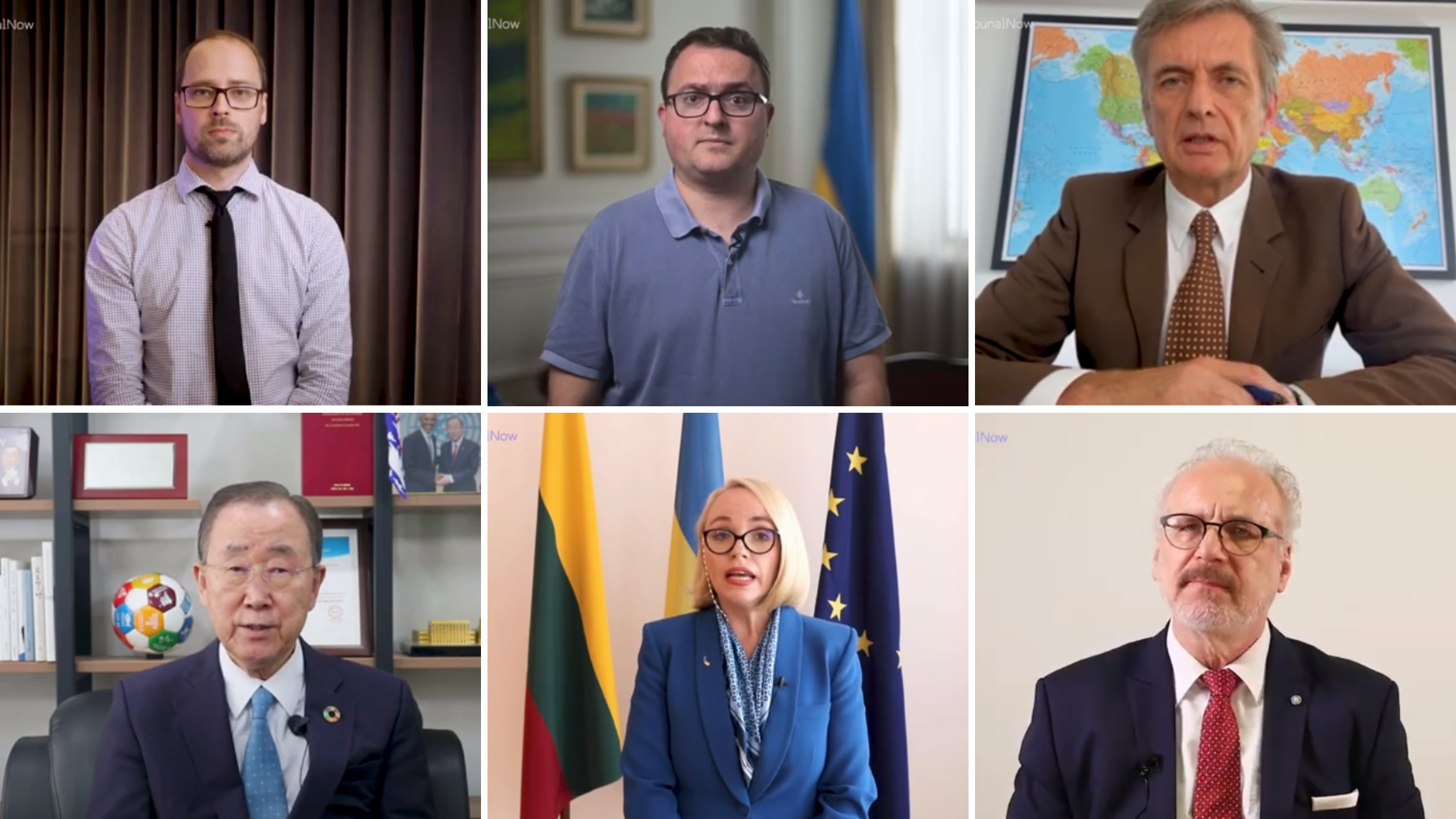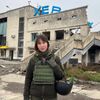Momentum is building for a Special Tribunal on Russian aggression
From frontline volunteers to global policymakers, the world is increasingly united on how to bring Russia's leaders to justice.

Justice for Ukraine is inevitable. That's the sentiment I've been getting lately from both global policy makers and frontline activists.
This isn't just optimistic thinking. It's inevitable because aggression will only keep worsening, including beyond Ukraine and by future aggressors, until there is meaningful justice. And the only meaningful justice means prosecuting Russia's leaders for the crime of aggression.
Since launching the #SpecialTribunalNow campaign with other frontline volunteers, messages of support have poured in from around the world and, in a short amount of time, I’ve had the honor of speaking with numerous individuals who have been campaigning for this much longer.
I was even able to speak with officials from the Baltic countries who have expressed support for the campaign and expressed tentative confidence in how the UN General Assembly would vote when given the opportunity to reaffirm the importance of the UN Charter and international law.
Estonia's Parliament recently voted unanimously to make the creation of a Special Tribunal on Russian aggression into one of its core international aims. As a result, Estonian officials among others, particularly in the Baltics, have increasingly been using the hashtag #SpecialTribunalNow too.
They've just published a new video series on the need for a #SpecialTribunalNow with experts representing other nations too. It's well worth listening to their thoughts to understand how global policy makers are increasingly uniting behind a way forward on justice for Russia's aggression.
Here's each video, along with a short summary:
Erki Kodar, Estonia
First up is a representative of the Estonian Foreign Ministry, which produces this video series.
Erki Kodar is Undersecretary for Legal and Consular Affairs. He breaks down the tricky issue of immunities for leaders.
The Head of State, Head of Government, and Minister of Foreign Affairs are known as the 'Troika' and traditionally enjoy immunities that prevent other states exercising power over them. That, Kodar explains, leads to the conclusion that a Ukrainian court would not be able to prosecute Russia's high leaders for their crime of aggression.
However, he proceeds to point out that these immunities are only for the purpose of ensuring the smooth functioning of state-to-state relations, but international courts with the clear backing of the international community have demonstrated that they do not have to recognise them. Hence why Putin has been issued arrest warrants for charges of removing children from Ukraine.
"We must fully discredit aggression as a tool of straightcraft," says Kodar. "International law has the means to hold leaders accountable for the crime of aggression and Estonia works tirelessly with allies to achieve that goal."
Anton Korynevych, Ukraine
Next is Ukraine's Ambassador-At-Large, Anton Korynevych, a specialist in international law who represents Ukraine at the International Criminal Court.
Korynevych starts with a clear overview of how Ukraine and the international community are working in unison with the International Criminal Court to bring justice for war crimes and crimes against humanity committed by Russia in its war against Ukraine.
While this is ongoing, Korynevych points out however that the same is not the case for the crime of aggression itself, which the International Criminal Court has objective difficulties in exercising jurisdiction over despite it being the supreme crime of international law as established at the Nuremberg tribunal.
Christian Wenaweser, Liechtenstein
Over to Liechtensten where Christian Wenaweser has had a big influence on the development of the International Criminal Court, including as Chair or the Special Working Group on the Crime of Aggression from 2003 to 2009, the period leading up to the definition being successfully agreed by all nations.
Wenaweser now serves as the Permanent Representative of Liechtenstein to the United Nations.
He explains that there are various proposals for how to ensure accountability for the crime of aggression by Russia against Ukraine, but the baseline must be the definition of aggression as agreed in customary international law and that means it is a leadership crime for which top political and military leaders must be held responsible. Therefore, any solution must overcome the challenge of immunities.
"Our legal analysis leads us to the conclusion that the solid way to do this is an international tribunal created on the basis of a recommendation from the General Assembly and negotiated between the United Nations and Ukraine," says Wenaweser.
Wenaweser does leave the door open to exploring other proposals "in a productive and constructive way" but only if it enables the full application of international law, including overcoming immunities.
Ban Ki-moon, South Korea
A heavyweight of global governance, Ban Ki-moon served as Secretary General of the United Nations from 2007 to 2016, during which time the defintion of aggression was adopted by all nations. He is now Deputy Chair of the Elders, the group founded by Nelson Mandela and consisting of world leading peace activists, human rights campaigners, and senior statesmen and women.
The Elders were early supporters of a Special Tribunal for Russian aggression and tweeted out in support of #SpecialTribunalNow after Ki-moon's video was published.
During the video, Ki-moon is very clear that "Russia's illegal war on Ukraine is a blatant violation of the U.N Charter" and that, because defending that charter is a core princple of collective responsibility, the world has a duty to establish a Special Tribunal for crime of aggression against Ukraine.
Ki-moon doesn't avoid naming the chief individual responsible.
"President Putin and others in Russia's leadership must be held accountable for their crimes," he asserts.
After briefly highlighting the challenge of prosecuting the crime of aggression within the International Criminal Court, Ki-moon states that, in his view, "the tribunal will be most effective and legitimate if it is grounded in international law and can demonstrate broad international support, including from Asia, Africa, and Latin America, through a U.N General Assembly resolution recommending its establishment."
He also refutes concerns that the pursuit of justice could make peace less likely.
"I have long believed that peace versus justice is a false choice and that we must pursue both with the equal vigor, in tandem."
He ends by imploring political leaders across the world to taje this decisive step when the issue is put to a UN General Assembly resolution "as I believe it must be".
Gabija Grigaitė-Daugirdė, Lithuania
Back to the Baltics where Gabija Grigaitė-Daugirdė where serves as Lithuania's Deputy Minister of Justice, in addition to being a lecturer in law Faculty at Vilnius University.
Grigaitė-Daugirdė provides an historical context to the development of international law from a century ago when waging war was not prohibited by international law up to the present day when we have a clear definition for the crime of aggression as a crime committed by leaders with individual responsibility.
"Definitions alone cannot afford justice and accountability for the supreme crime of aggression against Ukraine," she points out, however. Therefore, the "international community has to find political will and courage to close the judicial gap for the crime of aggression against Ukraine and to ensure accountability of those with the greatest power."
Egils Levits, Latvia
Completing the Baltic trio, Egils Levits was President of Latvia from 2019 to 2023, before which he was a lawyer and member of the European Court of Justice from 2004 to 2019.
Levits points out that neither the Nuremberg Trials nor the International Criminal Court was established based on precedent but rather the urgent need to ensure justice. Similarly, he says, even though the task of creating a tribunal is both legally and politically complex, "the international community has again and again proven that it can be brave and innovative in addressing existential issues".
Levits ends on a powerful, clear message.
"If we do not act now, the world order will be shifted towards chaos and anarchy. Therefore, Latvia and its allies advocate for the creation of the special tribunal now."
Conclusion
Small countries play a surprisingly large role in the development of international law, which makes sense as they best understand the importance of ending 'might makes right' and ensuring larger countries can not act with impunity against smaller countries.
It is clear that a wider global coalition is developing towards the creation of a Special Tribunal sooner rather than later, and that these countries and influential public figures are increasingly united in what that must mean.
There does appear to be some willingness to consider competing proposals for exactly how this will be established, but the baseline is that it must be justice for the crime of aggression and it must be prosecuted against Russia's highest leadership responsible as that was what was agreed by all countries as the supreme crime of international law.
The only question is how many more lives are going to be sacrifice to Russian aggression until the world realizes there is no other way to end these horrors. That's why we are demanding a Special Tribunal Now.
There's one more thing you can do
I decided to remix some of these videos, along with other clips showing support for the Special Tribunal. It's 2 minutes, 19 seconds so just under the limit for posting to Twitter (without having to pay Musk). Instead of just asking you to retweet it, you can download the video here and post it directly yourself anywhere where you feel people need to hear about the Special Tribunal and understand how momentum for it is building: https://we.tl/t-Y2A2PV4NyT
